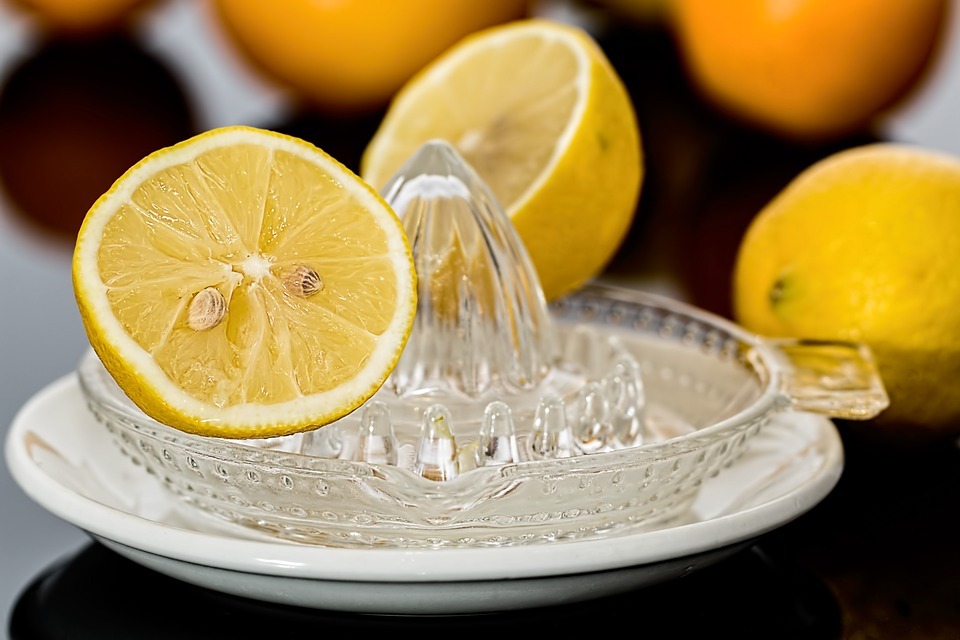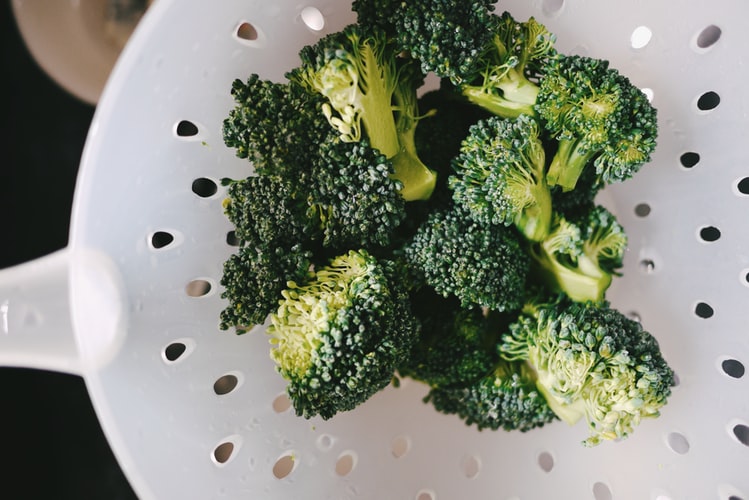Beet Juice: Health Benefits and Uses
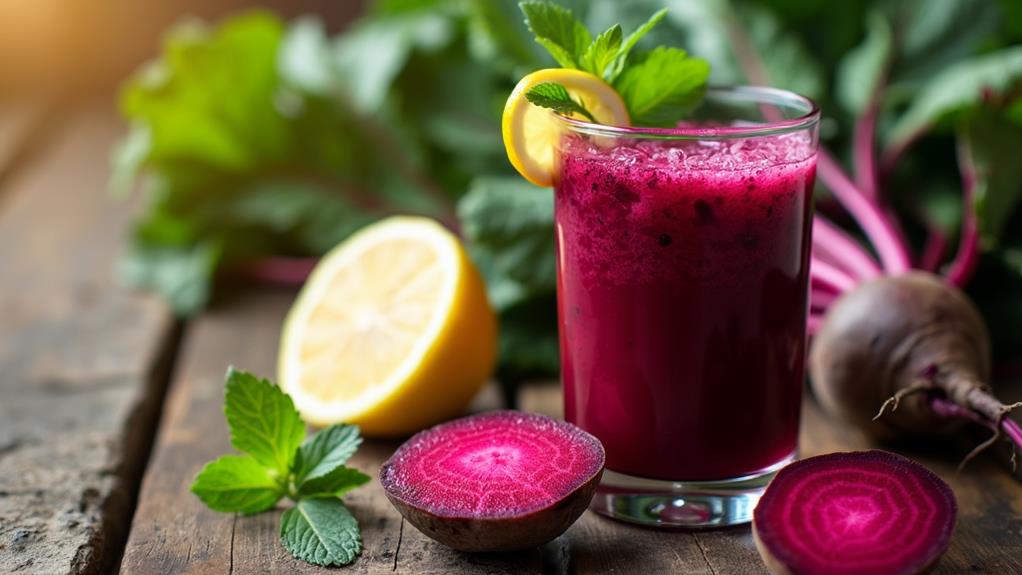
Beet juice offers a multitude of health benefits and versatile uses. It's low in calories and packed with vital nutrients like folate and potassium. Drinking beet juice can help lower blood pressure because it's rich in nitrates that improve blood flow. Athletes find it increases performance and delays fatigue during workouts. The antioxidants in beet juice reduce inflammation and support liver and cognitive health. It aids in digestion with its high fiber content and assists in weight management by promoting fullness. You can incorporate beet juice into smoothies, salads, or dressings. Let's investigate the full potential of beet juice.
Nutritional Profile
When looking at the nutritional profile of beet juice, you'll find it's both nutrient-rich and low in calories, with just about 29 calories per 100 ml serving. This makes it an excellent choice if you're seeking a low-calorie beverage that doesn't skimp on fundamental nutrients. Beet juice is packed with vitamins and minerals, including notable amounts of folate and potassium, which play significant roles in maintaining your general health.
Folate is fundamental for DNA synthesis and repair, making it critical for growth and development. Meanwhile, potassium helps regulate fluid balance, nerve signals, and muscle contractions, contributing to ideal body function. Furthermore, beet juice is rich in antioxidants, particularly betalains, which help combat oxidative stress and inflammation. By reducing these harmful processes, antioxidants support your body's natural defenses and promote well-being.
The nitrate content in beet juice is another highlight of its nutritional profile. Though we won't explore its effects on blood pressure here, it's worth noting that these compounds are linked to improved cardiovascular health. By incorporating beet juice into your diet, you're not just enjoying a rejuvenating drink; you're also nourishing your body with a powerhouse of fundamental nutrients and health-promoting compounds.
Blood Pressure Benefits
Beet juice stands out not only for its impressive nutritional profile but also for its remarkable effects on blood pressure management. If you're looking to lower blood pressure, incorporating beet juice into your routine could be a game-changer. Here's why:
- Nitrate Content: Beet juice is rich in nitrates, which your body converts to nitric oxide. This compound aids in vasodilation, allowing blood vessels to widen and reduce systolic blood pressure.
- Effectiveness for Hypertensive Individuals: Studies show that regular consumption of beet juice can lower systolic blood pressure by approximately 4-10 mmHg, especially in hypertensive individuals.
- Daily Intake Benefits: Consuming about 250 ml of beet juice daily for four weeks has demonstrated significant reductions in blood pressure among those with heightened levels, offering long-term health benefits.
- Raw Beets vs. Cooked Beets: Raw beets are more effective for blood pressure management than cooked ones due to higher nitrate content, making raw beet juice an ideal choice.
While beet juice can be beneficial, it is crucial to monitor your daily intake, especially if you have low blood pressure. Welcome the health benefits of this lively drink for a heart-healthy lifestyle.
Athletic Performance
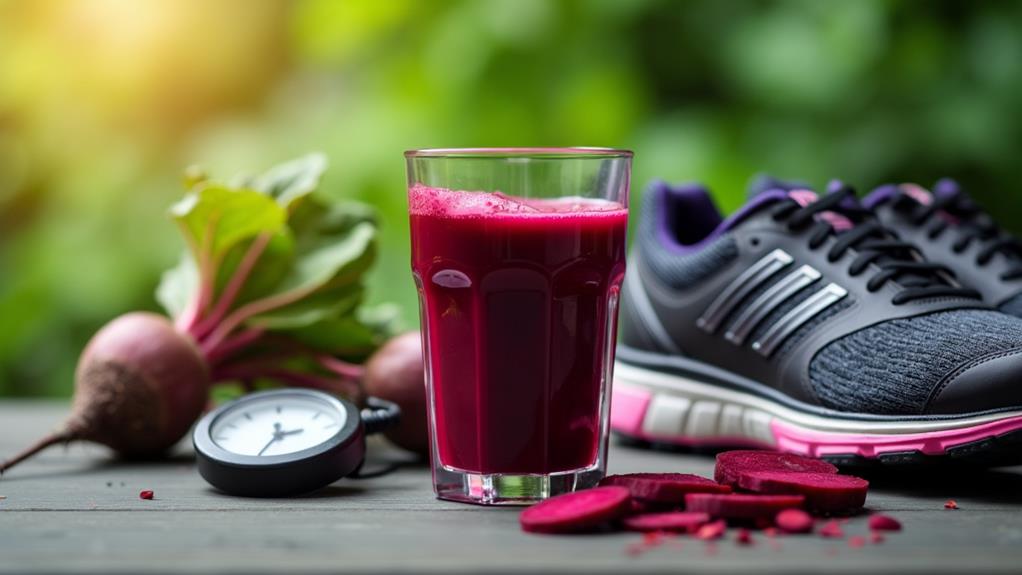
For athletes looking to improve their performance, incorporating beet juice into their regimen could be a game-changer. Beet juice is rich in nitrates, which your body converts to nitric oxide. This process amplifies blood flow and oxygen delivery to your muscles, considerably enhancing athletic performance. Regularly drinking beet juice can increase your exercise efficiency, allowing you to push through workouts with greater intensity and for longer durations before fatigue sets in.
Studies highlight that beet juice can improve your cardiorespiratory performance and extend your time to exhaustion during endurance activities. This benefit applies to both seasoned athletes and those just starting out. By consuming beet juice 2-3 hours before you exercise, you can optimize its performance-enhancing effects, with some research indicating up to a 20% improvement in oxygen utilization. This means your body uses oxygen more effectively, making each breath count.
Moreover, beet juice can reduce your perceived exertion during physical activity. This means that even during strenuous workouts, you may feel less taxed, allowing you to push your limits further. Incorporating beet juice into your routine could therefore be a simple yet powerful way to improve your athletic performance.
Inflammation Reduction
A powerful way to combat inflammation is by incorporating beetroot juice into your diet. Beetroot juice is packed with anti-inflammatory properties that can help you tackle chronic inflammation effectively. The presence of betalains, a type of phytochemical, plays an essential role in this process. These compounds inhibit inflammatory signaling pathways, leading to a significant 32% reduction in inflammatory enzyme activity.
Here are some key benefits of beetroot juice for inflammation reduction:
- Nitrate Content: Beet juice boasts a high nitrate content, which your body converts into nitric oxide. This promotes vasodilation, helping to alleviate inflammation-related health issues.
- Oxidative Stress Reduction: Regular consumption of beetroot juice can help reduce oxidative stress, which is often linked to inflammation. This reduction supports general health and well-being.
- Enhanced Immune Function: Phytochemicals in beetroot juice stimulate your immune system, further contributing to inflammation reduction.
- Chronic Inflammatory Conditions: By drinking beetroot juice, you may mitigate the effects of chronic inflammatory conditions thanks to its antioxidant and anti-inflammatory properties.
Incorporating beetroot juice into your daily routine could be a simple yet effective strategy to support your body's natural defense against inflammation.
Liver Health Support
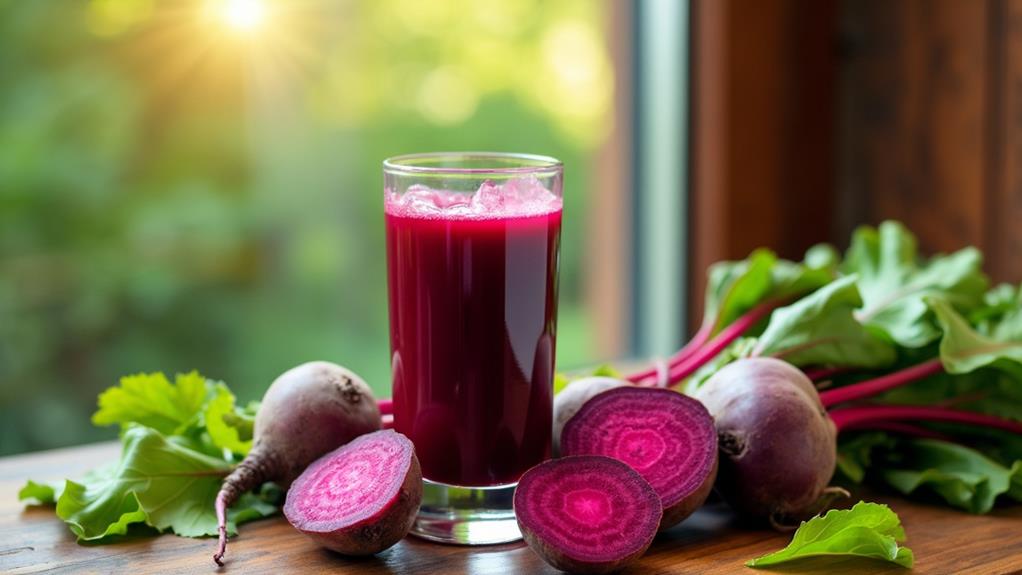
Supporting your liver health can be as simple as adding beetroot juice to your diet. Beet juice is packed with betaine, a compound that promotes liver function and aids in detoxification. By helping to reduce fatty liver deposits, betaine plays an essential role in maintaining a healthy liver. Regular consumption of beet juice improves liver enzyme activity, ultimately supporting your complete metabolic health.
Animal studies have shown that beet juice can have protective effects against liver toxins. This suggests it could be beneficial in managing liver diseases, providing an extra layer of defense for your liver health. Antioxidants found in beet juice combat oxidative stress, which is closely linked to liver damage. By reducing oxidative stress, beet juice helps protect your liver from potential harm.
Moreover, beet juice has been shown to reduce inflammation, another significant factor in maintaining liver health. By supporting the liver's detoxification processes, it helps keep the liver functioning effectively. Including beet juice in your diet not only aids liver health but also contributes to better metabolic health, making it a simple yet effective choice for those looking to support their liver's well-being.
Cognitive Function
Numerous studies suggest that beet juice could be a powerful ally in improving cognitive function, thanks to its rich nitrate content. These nitrates may increase blood flow to your brain, enhancing cognitive performance and potentially slowing age-related cognitive decline. Regularly sipping on beet juice can support your cognitive health, helping you perform better in memory and attention tasks.
Here are four key benefits of beet juice for your cognitive function:
- Improved Blood Flow: Nitrates in beet juice elevate cerebral blood flow, which could enhance your reaction times during cognitive tasks.
- Memory Support: The MIND diet, which includes beetroot, is linked to sharper memory and improved brain function, highlighting the vegetable's cognitive benefits.
- Antioxidant Protection: Antioxidants, particularly betalains found in beet juice, help protect your brain cells from oxidative stress, which contributes to better cognitive health.
- Overall Cognitive Health: With regular beet juice consumption, you'll enjoy better performance in memory and attention tasks, thanks to improved blood flow and reduced oxidative stress.
Incorporating beet juice into your routine could be a simple yet effective way to maintain and improve your cognitive function. Cheers to better brain health!
Digestive Health
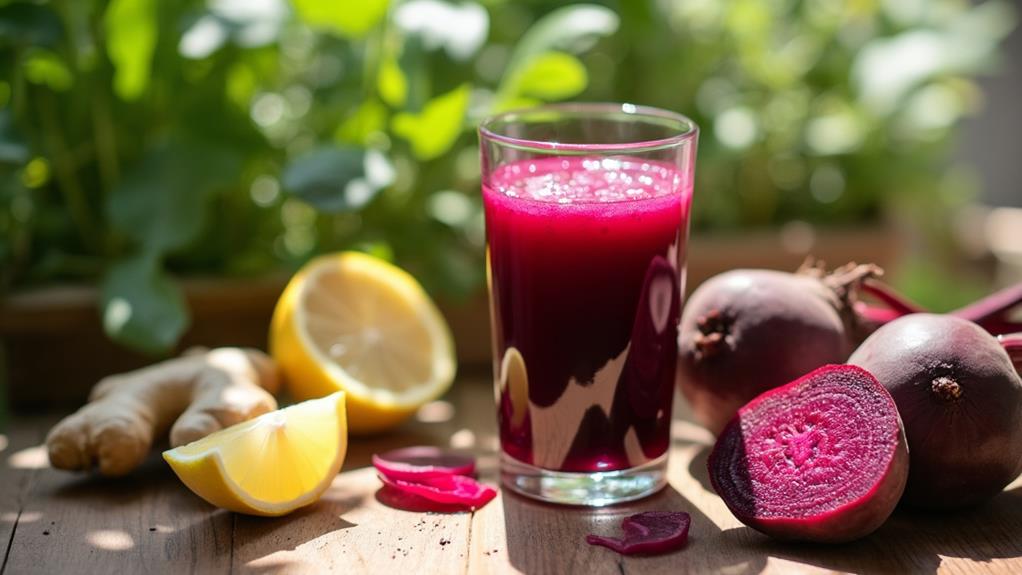
While beet juice is praised for its cognitive benefits, it's also a powerhouse for digestive health. Drinking beet juice regularly can transform your digestive experience, thanks to its high dietary fiber content. This fiber promotes regular bowel movements and prevents constipation, ensuring your digestive system runs smoothly. You'll find that a well-functioning digestive system is fundamental for comprehensive health.
The antioxidants in beet juice play a significant role in maintaining digestive health. They reduce oxidative stress and inflammation in your gut, creating a healthier environment for digestion. As a bonus, these antioxidants support the growth of beneficial gut bacteria, which are crucial for a healthy gut microbiome. This positive balance of gut bacteria further improves digestion and overall gut health.
Beet juice also contains phytochemicals that stimulate digestive enzymes, enhancing nutrient absorption in your digestive tract. This means your body can more effectively absorb the nutrients from the foods you eat, giving you more energy and liveliness. The natural sugars in beet juice provide a quick energy increase, while its fiber content helps you feel full longer. This combination can support your weight management efforts regarding digestive health.
Weight Management
Having investigated the benefits of beet juice for digestive health, let's now focus on its role in weight management. If you're aiming to manage your weight effectively, beet juice can be a fantastic supplement to your routine. It's low in calories, with only about 100 calories per cup, making it a smart, healthy beverage choice.
Here's how beet juice can aid in weight management:
- Promotes Satiety: Thanks to its high fiber content, beet juice helps you feel full longer, reducing hunger and aiding weight loss efforts.
- Energy Enhancement: The natural sugars in beet juice provide a gentle energy enhancement, perfect for starting your day without adding excessive calories.
- Improves Metabolic Rate: Regular consumption can help increase your metabolic rate, supporting weight control and encouraging healthier food choices.
- Nutritional Profile: It offers a balanced nutritional profile that can fit seamlessly into different weight management strategies.
Incorporating beet juice into your diet isn't just about cutting calories; it's an extensive approach to maintaining a healthy lifestyle. Regardless of your goals to lose weight or simply manage it better, beet juice offers a delicious, nutritious way to support your objectives.
Culinary Uses
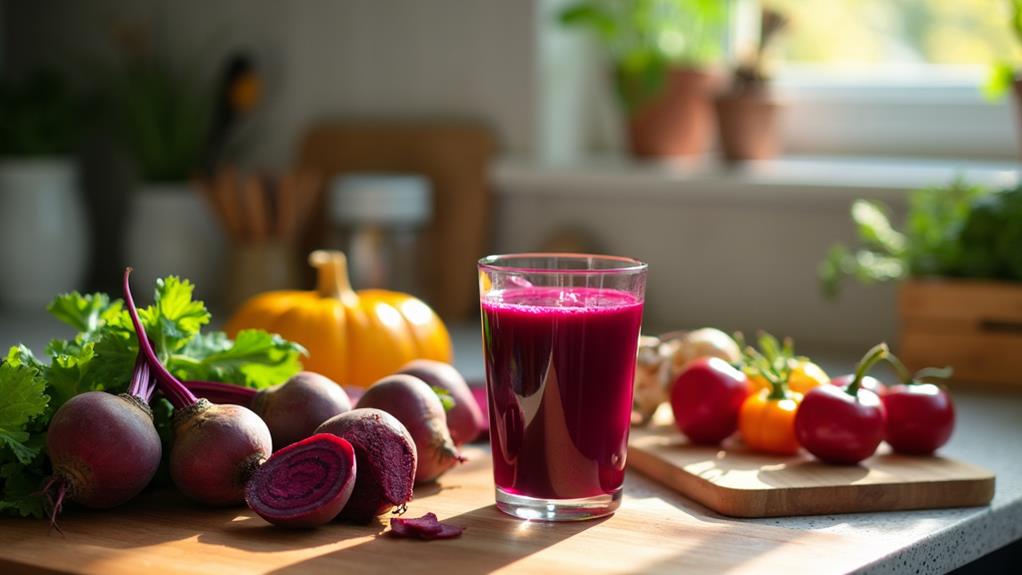
Brimming with versatility, beet juice is a culinary delight that can transform your dishes with its brilliant color and natural sweetness. Its culinary uses are endless, irrespective of you're blending it into smoothies, creating zesty salad dressings, or enriching marinades. The vivid hue and flavor of beet juice improve any dish, making it not only visually appealing but also packed with health benefits.
When you roast or steam beets, they maintain their nutritional value while offering a deeper, more robust flavor, perfect for salads or as a savory side. Beet juice can also be a star ingredient in healthy dips like hummus or yogurt-based spreads, turning ordinary snacks into nutrient-rich delights. These dips are not only tasty but also provide a good dose of vitamins and antioxidants.
Incorporating beet juice into baked goods such as brownies or pancakes can raise their moisture and nutritional content without overshadowing the taste. For a revitalizing twist, mix beet juice with citrus juices like orange or lemon. This not only improves the flavor but also delivers a rich source of vitamins and antioxidants, making it a superb choice for a rejuvenating drink.
Potential Side Effects
Although beet juice offers a range of culinary delights, it's crucial to be aware of its potential side effects. Knowing these can help you make informed decisions about incorporating beet juice into your diet.
- Temporary Discoloration: You might notice a change in the color of your urine or feces after drinking beet juice. This harmless phenomenon, called beeturia, is due to betalains.
- Low Blood Pressure: If you have low blood pressure, be cautious with beet juice. Its nitrate content could further lower your blood pressure levels, which might not be ideal for everyone.
- Gastrointestinal Discomfort: While most people tolerate beet juice well, excessive consumption can lead to gastrointestinal discomfort or diarrhea, especially if you're sensitive to it.
- Allergic Reactions: Though rare, some individuals may experience allergic reactions to beetroot. Keep an eye out for symptoms like hives or itching.
Before making beet juice a regular part of your diet, consider a consultation with healthcare providers, particularly if you have existing health conditions or are on certain medications. Being aware of these side effects guarantees you enjoy beet juice safely and healthily.

